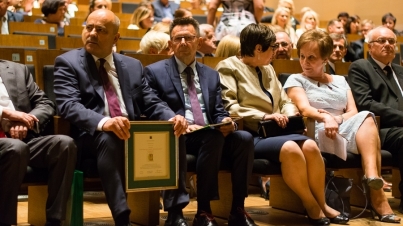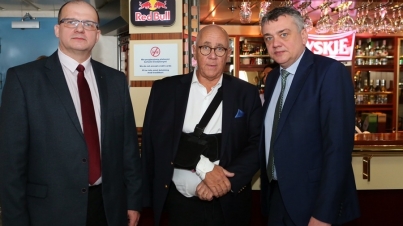News
News
People
Presentations
After Hours
Calendar
Currencies
Galleries
Advertising
About us
Contact
Adressess
Newsletter
How was 2011? What will 2012 hold?
Summary of the year by: Krystian Stypuła, Jarosław Siergiej, Wojciech Ciuruś, Dagmara Bogacka-Iskra, Adam Markowski, Izabela Szukiewicz.

Krystian Stypuła, co-owner of Home.pl:
The year 2011 was another year of growing importance of social media. The revolution across North Africa supported by Facebook or the riots in London where people were organizing themselves using Blackberry and Twitter show that social media have become a power that is hard to define.
In Poland, the spectacular acquisition of Plus GSM by Zygmunt Solorz creates a great opportunity for the combination of a large number of media in one capital group. The prospects are excellent. The questions is whether the transaction will work out financially. I keep my fingers crossed!
It is interesting that digitization has been elevated to a ministerial level. There is a lot of work in store for Mr Boni, who will have to deal with the long neglected and chaotic computerization of state offices.
I am surprised with another idle year for Nasza Klasa. It seems that all users have met who they wanted to meet and refreshed memories and the owners are short of ideas how to revive the website. What I would like to say to the owners is – step away from this path!
As far as Szczecin is concerned, I am happy about investments in the city. Not only IT investments. The city is developing. There is talk about future. The stagnation is coming to an end, which makes me – a Szczecin-born – very happy.
For home.pl, 2011 was good. Despite tough market conditions we maintained a double-digit growth. We are very close to getting an investor that should give us a real boost.
Jarosław Siergiej, President of Szczecin and Swinoujscie Seaports Authority:
Considering the economy, the performance of Szczecin and Swinoujscie Seaports Authority in 2011 was very good – our estimates of 20.9 million tons would be similar to last year results. Despite the decrease in the volume of handled coal, by the end of the year it will be approx. 5.4 million ton, which is nearly twice as much as Gdynia and Gdańsk together. The decrease was compensated by a high – 60 percent – increase in the handling of “other bulk products”. A material (10 percent) increase was recorded in the largest load group, i.e. general cargo, up to 9.2 million tons. Ferriage has the biggest share in the group and its volume increased by 9 percent compared to the prior year. Despite the greater handling and storage potential, this year the volume of cereal and cereal products was not raised. The operating profit in 2011 will be comparable to the one last year, which was record high.
We were also successful in investing activities. Work is progressing well on our large scale investment programme and in 2012 we are planning the launch of two new investments for the total amount of 140 million.
Wojciech Ciuruś, Vice-President of Ciroko:
The year 2011 was rich in large residential projects, therefore we can be fairly certain that next year we will see an oversupply of apartments. Considering the tightening of the credit policy of banks and the coming into force of the so-called property developers act, many companies may experience perturbations – in particular increase in expenses. Therefore, many of them have already taken precautionary measures: planning a lot less residential investment, dispersing investments or looking for public contracts. Unfortunately, as far as public contracts are concerned, we are seeing a worrying trend, which at the time of crisis is escalating. I mean here understating prices by some companies participating in tenders. And it is the lowest price, not credentials or experience of the contractor that very often determine the success. As a result, investment projects are often delayed or simply negligent. This year, Ciroko had very good sales. A particularly successful project was the housing estate at Robotnicza Street which combined high standard with affordable prices and the apartments met the requirements of the government housing subsidy “Rodzina na swoim”. Other investment projects completed this year include a services and residential estate for Polnord and the headquarters of the Social Security Institution in Prawobrzeże.
Dagmara Bogacka-Iskra, Director of Opel, Chevrolet Jerzy Bogacki showrooms, co-owner of Mercedes Benz DDB Auto Bogacka showroom:
Unfortunately, in 2011 the sales of cars dropped– luckily, the drop was not equal for all brands and price categories. As far as our showrooms are concerned, it is more visible for Opel and less – for more expensive and luxurious brands, e.g. Mercedes. We can assume that people of moderate means feel less secure – during prosperity they are more willing to make big purchases, but when the economy becomes less stable, they prefer to put them off. This is certainly the effect of the news about the situation of the economy in Europe, the announcement of further waves of the crisis and the uncertainty of the euro zone. Clients put off major purchases and prefer to wait out the uncertain market. We see similar drops in the maintenance division, which experiences long stoppages. However, if our clients buy a new car, it is rarely a basic version with no add-ons.
We think that the next year, at least the first half, will be comparable to this year. I do hope though that the second half of the year – with Euro 2012 – will bring us more optimism which is crucial for our industry and boost car sales. We have a wide range of cars to offer and therefore we are optimistic about the future.
Adam Markowski, Branch Director at Markowscy Nieruchomości:
The year 2011 did not bring any material changes for the real estate market. Sales maintained the downward trend. In the majority of big cities, the average price per square meter went down by several hundred PLN. In Szczecin the average price per square meter in 2011 was PLN 4,248.20 compared to PLN 4,421.60 in 2010 (less by 3.9 percent). The biggest price drop was recorded in the secondary housing market, especially by large apartments and those in need of a major overhaul. New buildings were less sensitive to price drops. The price of those in attractive locations even appreciated.
The residential housing market was affected primarily by the mortgage market, which in 2011 underwent several major changes. In Q3 2011 the government housing subsidy “Rodzina na swoim” was expanded to include single people. Another significant change in the mortgage market, which will come into force in January, is the new Recommendation S, which will lower the credit standing, by decreasing the ratio of loan instalment to the above-average incomes. The majority of the changes is unfavourable for the borrowers and limits credit availability. A report of the Polish Bank Association shows that in 2011 the volume and value of extended mortgages dropped.
In 2011 Szczecin saw the biggest demand for small and medium (two, three rooms) apartments, from 40m2 to 60m2, in new buildings, but also in old panel buildings. The most expensive districts include the city centre, Pogodno, Stare Miasto, Warszewo, Gumieńce and Os. Słoneczne.
The forecasts for 2012 are not optimistic – neither for the borrowers, property developers nor private owners who want to sell their apartments. Further price decrease and their hardening will be beneficial only for those who plan to buy an apartment without a loan.
Izabela Szukiewicz, co-owner of Bohema Restaurant:
This year we experienced a feeling of insecurity about the future. Our costs went up as did the prices in Poland. Very often restaurant owners had to lower their margin, because we cannot raise our prices yet further.
In Szczecin, the tradition of eating out in restaurants is still young. For many people this is not something important, something they wish to spend money on, and the more affluent are simply too busy. Szczecin does not have well developed business and tourism, both of which boost the restaurant business. We don’t get random guests who are here on holidays and step in. We need to solicit each client and strive to keep them.
The beginning of the next year is not promising, especially that January is the winter school break which together with August is the time of the worst stagnation. I do hope though that our regular customers and partners will stay with us. In our business, the success depends primarily on the success of our customers. It may happen that only the strongest will survive these difficult times.
by KZ












































